全球化的利与弊 Economic globalization(英汉)
经济全球化的好处和坏处英语作文
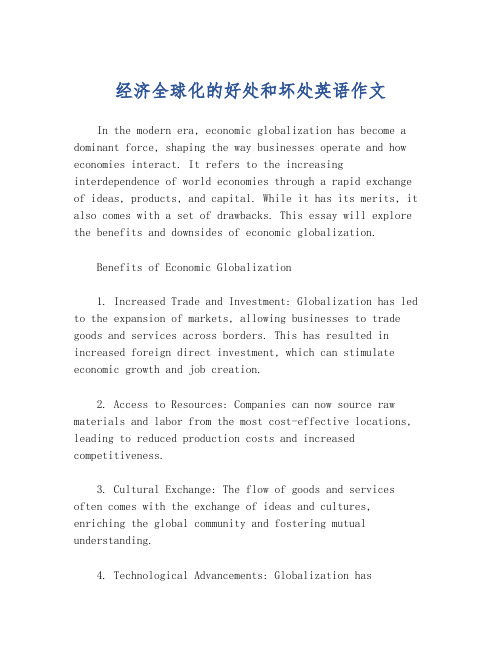
经济全球化的好处和坏处英语作文In the modern era, economic globalization has become a dominant force, shaping the way businesses operate and how economies interact. It refers to the increasing interdependence of world economies through a rapid exchange of ideas, products, and capital. While it has its merits, it also comes with a set of drawbacks. This essay will explore the benefits and downsides of economic globalization.Benefits of Economic Globalization1. Increased Trade and Investment: Globalization has led to the expansion of markets, allowing businesses to trade goods and services across borders. This has resulted in increased foreign direct investment, which can stimulate economic growth and job creation.2. Access to Resources: Companies can now source raw materials and labor from the most cost-effective locations, leading to reduced production costs and increased competitiveness.3. Cultural Exchange: The flow of goods and services often comes with the exchange of ideas and cultures, enriching the global community and fostering mutual understanding.4. Technological Advancements: Globalization hasaccelerated the spread of technology and innovation, as companies in different parts of the world can now collaborate more easily.5. Economic Growth: Many economies have experienced growth due to the increased trade and the opportunities for expansion into new markets.Drawbacks of Economic Globalization1. Inequality: While some benefit from globalization, others may not. Wealth and opportunities are often concentrated among a few, leading to economic disparities both within and between countries.2. Cultural Homogenization: The spread of global brands and culture can sometimes lead to the erosion of local cultures and traditions, as they are replaced by a more uniform global culture.3. Labor Exploitation: In the pursuit of lower costs, some companies may exploit workers in developing countries, where labor laws may be less stringent.4. Environmental Impact: The increased demand for production and transportation can lead to environmental degradation and contribute to climate change.5. Economic Vulnerability: Globalization can also mean that economic downturns in one part of the world can quickly spread to others, as seen in the global financial crisis of2008.ConclusionEconomic globalization is a complex phenomenon with the potential to bring about significant benefits, such as economic growth and technological progress, but it also poses challenges, including inequality and environmental concerns. It is crucial for policymakers and business leaders to work towards a balanced approach that maximizes the advantages while mitigating the negative impacts. By doing so, globalization can be a force for positive change in the global economy.。
全球化利弊英语作文
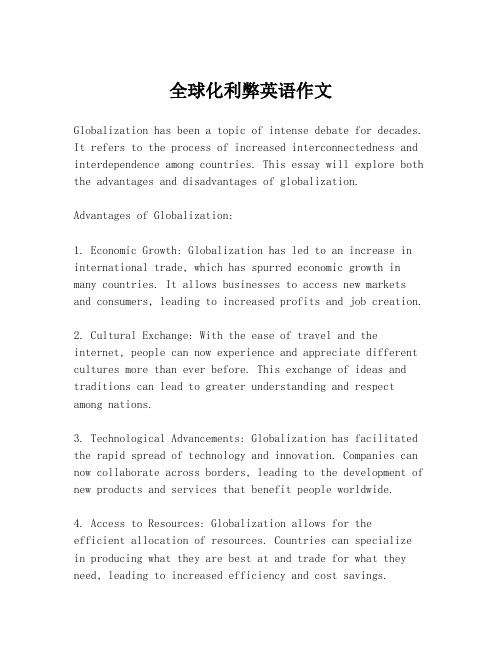
全球化利弊英语作文Globalization has been a topic of intense debate for decades. It refers to the process of increased interconnectedness and interdependence among countries. This essay will explore both the advantages and disadvantages of globalization.Advantages of Globalization:1. Economic Growth: Globalization has led to an increase in international trade, which has spurred economic growth in many countries. It allows businesses to access new markets and consumers, leading to increased profits and job creation.2. Cultural Exchange: With the ease of travel and the internet, people can now experience and appreciate different cultures more than ever before. This exchange of ideas and traditions can lead to greater understanding and respect among nations.3. Technological Advancements: Globalization has facilitated the rapid spread of technology and innovation. Companies can now collaborate across borders, leading to the development of new products and services that benefit people worldwide.4. Access to Resources: Globalization allows for theefficient allocation of resources. Countries can specializein producing what they are best at and trade for what they need, leading to increased efficiency and cost savings.5. Educational Opportunities: Students can now study abroad more easily, gaining exposure to different educational systems and broadening their horizons. This can lead to a more skilled and globally aware workforce.Disadvantages of Globalization:1. Job Displacement: While globalization creates jobs, it can also lead to job losses, particularly in industries that can be outsourced to countries with lower labor costs. This can lead to unemployment and economic instability in certain regions.2. Cultural Homogenization: The spread of global brands and media can lead to a loss of local culture and identity. Some argue that this results in a loss of cultural diversity and uniqueness.3. Environmental Concerns: The increased production and transportation associated with globalization can lead to environmental degradation. Issues such as pollution and climate change are exacerbated by the global scale of industrial activities.4. Economic Inequality: While some benefit greatly from globalization, others are left behind. Wealth disparities can increase, both within and between countries, leading tosocial unrest and dissatisfaction.5. Dependency on Foreign Markets: Countries that rely heavilyon international trade can be vulnerable to economic downturns in other parts of the world. This can lead to economic instability and a lack of self-sufficiency.In conclusion, globalization offers numerous benefits such as economic growth, cultural exchange, and technological advancements. However, it also presents challenges such as job displacement, cultural homogenization, and environmental concerns. It is crucial for policymakers and stakeholders to address these issues to ensure that globalization is sustainable and beneficial for all.。
全球化的利弊英语作文
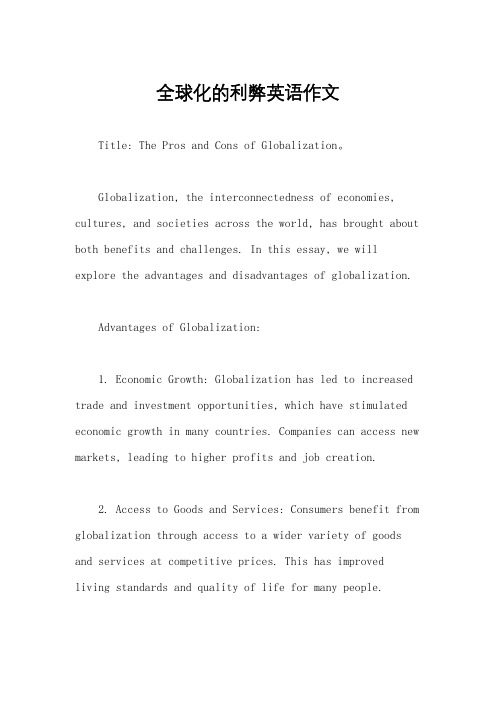
全球化的利弊英语作文Title: The Pros and Cons of Globalization。
Globalization, the interconnectedness of economies, cultures, and societies across the world, has brought about both benefits and challenges. In this essay, we will explore the advantages and disadvantages of globalization.Advantages of Globalization:1. Economic Growth: Globalization has led to increased trade and investment opportunities, which have stimulated economic growth in many countries. Companies can access new markets, leading to higher profits and job creation.2. Access to Goods and Services: Consumers benefit from globalization through access to a wider variety of goods and services at competitive prices. This has improvedliving standards and quality of life for many people.3. Cultural Exchange: Globalization facilitates the exchange of ideas, values, and cultural practices among nations. This cultural diversity enriches societies and promotes understanding and tolerance among people from different backgrounds.4. Technological Advancement: Globalization has spurred innovation and technological advancement by encouraging collaboration and knowledge sharing across borders. This has resulted in improvements in various fields, including healthcare, communication, and transportation.5. Global Cooperation: Global challenges such as climate change, terrorism, and pandemics require international cooperation. Globalization has fostered closer ties between nations, enabling them to work together to address common issues.Disadvantages of Globalization:1. Growing Economic Inequality: While globalization has led to overall economic growth, it has also widened the gapbetween the rich and the poor within and between countries. Some regions and social groups have been left behind, exacerbating poverty and inequality.2. Cultural Homogenization: The spread of global media and consumer culture has led to the erosion of localcultures and traditions. This cultural homogenization can result in the loss of cultural diversity and identity.3. Environmental Degradation: The pursuit of economic growth in a globalized world has often come at the expenseof the environment. Industrialization, deforestation, and pollution have led to environmental degradation and climate change, threatening the planet's sustainability.4. Exploitation of Workers: Globalization has led tothe outsourcing of jobs to countries with lower labor costs, where workers may be exploited and subjected to poorworking conditions. This has raised concerns about labor rights and social justice.5. Vulnerability to Economic Shocks: Interconnectedglobal markets can magnify the impact of economic crises and financial instability. A downturn in one part of the world can quickly spread to others, leading to widespread economic turmoil and hardship.In conclusion, while globalization has brought about significant benefits in terms of economic growth, cultural exchange, and technological advancement, it also poses challenges such as economic inequality, cultural homogenization, environmental degradation, exploitation of workers, and vulnerability to economic shocks. It is essential for policymakers to address these challenges while harnessing the opportunities presented by globalization to create a more inclusive, sustainable, and prosperous world for all.。
英语作文全球化的利弊
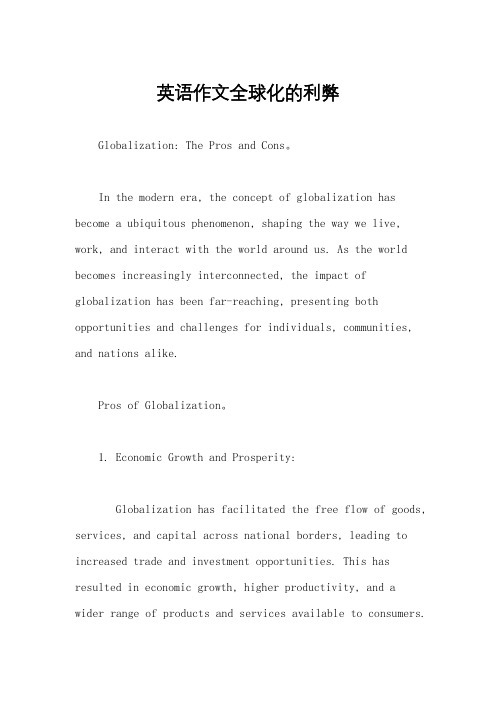
英语作文全球化的利弊Globalization: The Pros and Cons。
In the modern era, the concept of globalization has become a ubiquitous phenomenon, shaping the way we live, work, and interact with the world around us. As the world becomes increasingly interconnected, the impact of globalization has been far-reaching, presenting both opportunities and challenges for individuals, communities, and nations alike.Pros of Globalization。
1. Economic Growth and Prosperity:Globalization has facilitated the free flow of goods, services, and capital across national borders, leading to increased trade and investment opportunities. This has resulted in economic growth, higher productivity, and a wider range of products and services available to consumers.Developing countries, in particular, have benefited from increased access to global markets, enabling them to participate in the global economy and improve the standardof living for their citizens.2. Technological Advancements:Globalization has accelerated the pace of technological innovation and the dissemination of knowledge. The exchange of ideas, technologies, and best practices across borders has fueled scientific and technological progress, leading to advancements in fields such as healthcare, communication, and transportation. This has improved the quality of life for people around the worldand has the potential to address global challenges more effectively.3. Cultural Exchange and Diversity:Globalization has facilitated the exchange ofcultural ideas, traditions, and practices, leading to a greater appreciation and understanding of diverse cultures.This has enriched the cultural landscape, exposing peopleto new perspectives, cuisines, and art forms. The increased interaction between different cultures has the potential to foster greater tolerance, empathy, and mutual understanding, contributing to a more inclusive and harmonious global community.4. Improved Access to Education and Knowledge:Globalization has expanded access to education and knowledge, enabling people from around the world to access information and educational resources more easily. Online learning platforms, international student exchanges, and collaborative research projects have made it possible for individuals to gain knowledge and skills that werepreviously inaccessible, empowering them to pursue their aspirations and contribute to the global knowledge economy.Cons of Globalization。
全球化优缺点英文版
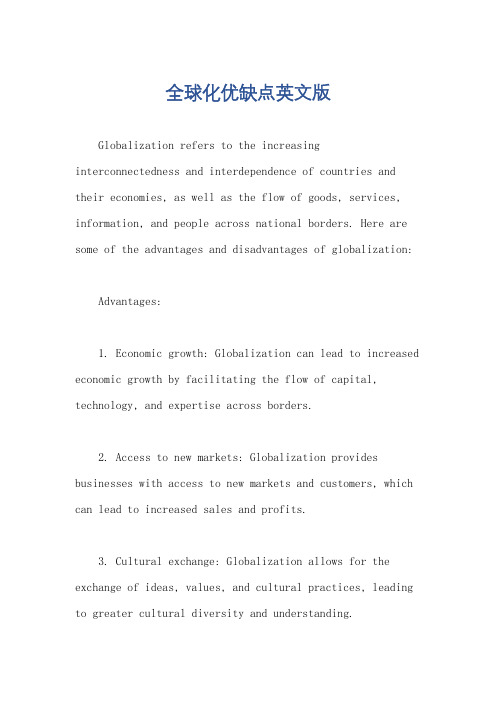
全球化优缺点英文版Globalization refers to the increasing interconnectedness and interdependence of countries and their economies, as well as the flow of goods, services, information, and people across national borders. Here are some of the advantages and disadvantages of globalization:Advantages:1. Economic growth: Globalization can lead to increased economic growth by facilitating the flow of capital, technology, and expertise across borders.2. Access to new markets: Globalization provides businesses with access to new markets and customers, which can lead to increased sales and profits.3. Cultural exchange: Globalization allows for the exchange of ideas, values, and cultural practices, leading to greater cultural diversity and understanding.4. Innovation: Globalization can foster innovation by allowing for the exchange of knowledge and best practices across different countries and industries.Disadvantages:1. Growing inequality: Globalization can exacerbate income inequality within and between countries, as wealth and opportunities may be concentrated in the hands of a few.2. Environmental impact: Globalization can lead to increased environmental degradation due to the expansion of production and consumption, as well as the transportationof goods over long distances.3. Loss of cultural identity: Globalization can lead to the homogenization of cultures, as local traditions and customs may be overshadowed by globalized consumer culture.4. Vulnerability to global shocks: Globalization can make countries more vulnerable to global economic andfinancial shocks, as well as health crises and other global challenges.In conclusion, while globalization has brought about many benefits such as economic growth and cultural exchange, it also presents challenges such as growing inequality and environmental impact. It is important for policymakers and stakeholders to address these challenges in order to ensure that the benefits of globalization are shared moreequitably and sustainably.。
全球化对经济利弊英语作文
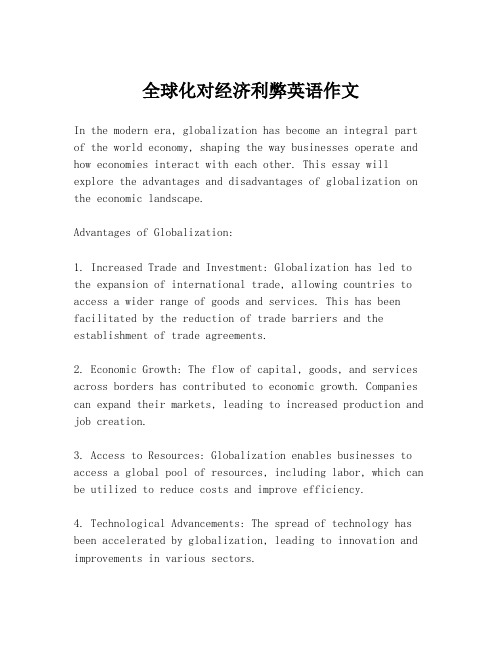
全球化对经济利弊英语作文In the modern era, globalization has become an integral part of the world economy, shaping the way businesses operate and how economies interact with each other. This essay will explore the advantages and disadvantages of globalization on the economic landscape.Advantages of Globalization:1. Increased Trade and Investment: Globalization has led to the expansion of international trade, allowing countries to access a wider range of goods and services. This has been facilitated by the reduction of trade barriers and the establishment of trade agreements.2. Economic Growth: The flow of capital, goods, and services across borders has contributed to economic growth. Companies can expand their markets, leading to increased production and job creation.3. Access to Resources: Globalization enables businesses to access a global pool of resources, including labor, which can be utilized to reduce costs and improve efficiency.4. Technological Advancements: The spread of technology has been accelerated by globalization, leading to innovation and improvements in various sectors.5. Cultural Exchange: Economic ties often lead to cultural exchanges, fostering mutual understanding and cooperation among nations.Disadvantages of Globalization:1. Inequality: While some benefit from globalization, it can also exacerbate income inequality. Multinational corporations may profit significantly, while local businesses and workers can suffer.2. Cultural Homogenization: The spread of global brands and cultures can lead to a loss of local identities and traditions, as they are overshadowed by dominant global cultures.3. Economic Vulnerability: Global interconnectedness means that economic downturns in one country can quickly spread to others, as seen in the global financial crisis of 2008.4. Labor Exploitation: In the pursuit of lower costs, some companies may shift production to countries with lax labor laws, leading to exploitation and poor working conditions.5. Environmental Concerns: The increase in production and transportation for global markets can lead to greater environmental degradation and resource depletion.In conclusion, globalization has both the potential to enrich and to impoverish the global economy. It is a complex phenomenon that requires careful management to ensure thatits benefits are widely distributed and its drawbacks are mitigated. Policymakers, businesses, and individuals must work together to harness the positive aspects of globalization while addressing its challenges.。
全球化利弊 英语作文

Globalization is a phenomenon that has been taking place for centuries,but it has accelerated in recent decades due to technological advancements and increased interconnectedness among countries.It refers to the process of increased interaction and integration among people,companies,and governments worldwide.While globalization has brought about numerous benefits,it has also led to some drawbacks.This essay will explore both the advantages and disadvantages of globalization.Advantages of Globalization1.Economic Growth:Globalization has been a catalyst for economic growth in many countries.By opening up markets,it has allowed for the exchange of goods and services, leading to increased trade and investment.This has created jobs and raised living standards in many parts of the world.2.Access to Goods and Services:Consumers now have access to a wider variety of products than ever before.This is due to the ease of importing goods from different countries,which has led to a greater diversity of products available in local markets.3.Cultural Exchange:Globalization has facilitated the spread of ideas,cultures,and traditions across borders.This cultural exchange enriches societies and promotes understanding and tolerance among different cultures.4.Technological Advancement:The global spread of technology has been accelerated by globalization.Innovations in one part of the world can quickly be adopted and adapted in another,leading to rapid advancements in various fields such as medicine, communication,and transportation.Disadvantages of Globalization1.Economic Disparity:While globalization has led to economic growth,it has also contributed to economic disparities.Wealthier nations and multinational corporations often benefit more from globalization,leaving poorer countries and individuals behind.2.Job Displacement:The ease of outsourcing jobs to countries with lower labor costs has led to job losses in developed countries.This can result in unemployment and social unrest,as well as a decrease in the quality of life for those affected.3.Cultural Homogenization:The dominance of certain cultures,often those of economically powerful nations,can lead to the erosion of local cultures and traditions. This can result in a loss of cultural diversity and identity.4.Environmental Impact:The increased movement of goods and people across borders can lead to environmental degradation.The carbon footprint of transportation and the exploitation of natural resources for the production of goods are significant concerns.5.Loss of Sovereignty:Countries may experience a loss of control over their economic and political decisions due to the influence of multinational corporations and international trade agreements.This can lead to policies that favor the interests of these entities over the needs of the local population.ConclusionGlobalization is a complex process with farreaching implications.While it offers opportunities for economic growth,cultural exchange,and technological advancement,it also presents challenges such as economic disparity,job displacement,and environmental degradation.It is essential for policymakers and societies to carefully consider these factors and strive to mitigate the negative impacts of globalization while maximizing its benefits.This can be achieved through responsible trade practices,fair labor standards, and sustainable development initiatives that take into account the needs of both people and the planet.。
全球化的好处和坏处英文作文

全球化的好处和坏处英文作文The Pros and Cons of Globalization.Globalization has become a significant force in today's interconnected world, shaping various aspects of life, from economics to culture and technology. It involves the integration of markets, ideas, and cultures across borders, leading to unprecedented levels of interdependence and exchange. While globalization offers numerous benefits, it also presents some challenges and potential downsides.Benefits of Globalization.1. Economic Growth and Prosperity: Globalization has fostered economic growth and prosperity by opening up new markets and opportunities for trade. It has enabledcountries to specialize in their areas of comparative advantage, leading to increased productivity and efficiency. Furthermore, it has facilitated the flow of capital, technology, and know-how, which has spurred innovation andtechnological advancement.2. Cultural Exchange and Understanding: Globalization has broken down cultural barriers, promoting the exchange of ideas, art, and traditions across borders. This has led to a more tolerant and understanding society, where people appreciate and embrace diverse cultural identities. It has also fostered creativity and innovation by bringing together different perspectives and insights.3. Improved Access to Resources: Globalization has made it easier for countries to access critical resources, such as food, energy, and raw materials. This has helped to alleviate poverty and improve living standards in many parts of the world. Additionally, it has enabled the sharing of knowledge and expertise, which has led to better health care, education, and infrastructure development.4. Global Collaboration and Problem-Solving: Globalization has facilitated international collaboration and cooperation on a range of global issues, such as climate change, poverty alleviation, and disease control.By working together, countries can pool their resources, expertise, and knowledge to address these challenges more effectively.Downsides of Globalization.1. Economic Inequality: While globalization has led to overall economic growth, it has also created economic disparities between countries and within countries. Some countries and regions have benefited more than others, leading to a widening gap between the rich and the poor. This inequality can lead to social tensions and political instability.2. Cultural Homogenization: As cultures mingle and influence each other, there is a concern that globalization may lead to the loss of cultural diversity and the homogenization of global culture. This can erode the unique identities and values of different cultures, leading to a loss of richness and variety.3. Environmental Degradation: Globalization has led toincreased industrialization and consumption, which has taken a heavy toll on the environment. Issues such as climate change, pollution, and deforestation are exacerbated by the unchecked growth and extractive practices associated with globalization.4. Job Displacement and Social Unrest: The influx of foreign goods and services into domestic markets can lead to job displacement and economic instability. This can create social unrest and political tension, as people struggle to adapt to the changing economic landscape. Additionally, the race to the bottom in terms of labor costs and regulations can lead to the exploitation of workers in some parts of the world.In conclusion, globalization is a complex phenomenon that brings both benefits and challenges. While it has fostered economic growth, cultural exchange, and global collaboration, it has also led to economic inequality, cultural homogenization, environmental degradation, and social unrest. It is important to recognize both the positives and the negatives of globalization and worktowards creating a more inclusive and sustainable global economy that benefits everyone.。
- 1、下载文档前请自行甄别文档内容的完整性,平台不提供额外的编辑、内容补充、找答案等附加服务。
- 2、"仅部分预览"的文档,不可在线预览部分如存在完整性等问题,可反馈申请退款(可完整预览的文档不适用该条件!)。
- 3、如文档侵犯您的权益,请联系客服反馈,我们会尽快为您处理(人工客服工作时间:9:00-18:30)。
全球化的利与弊Economic globalization全世界都在谈论全球化,有的人认为它是本世纪的发明,有的人看到它的负面影响。
经济上的利与弊:随着电子货币的到来,投资变得很方便,只要点击一下,大量货币就会从一个国家流通到另一个国家。
这就开辟了个人投资的新渠道。
提高了劳工的流动性,因此开辟了前所未有的就业和培训前景。
激烈的竞争促使价格下降和服务的改进,例如送货上门和售后服务。
全球化导致产生统一市场,从而使那些不在这个市场中的国家受到更多的剥削。
仅仅300家公司就占全球产值的三分之一,占国际贸易的一半。
而食品生产则由12家公司控制。
贫困的劳工群体越来越被排斥在外。
不稳定性在增加,1997年在欧洲抛售黄金储备的传闻就使南非5万矿工失业。
这就是多米诺骨牌效应。
All over the world about globalization, some people think that it is the invention, some people see its negative effects.Economic advantages and disadvantages:With the arrival of electronic money, it's very convenient for investment, click, a lot of money from one country to flow into another country. It opened up new avenues of personal investment. To improve the labor mobility, and thus opened an employment and training.Competitive price and service to the improvement, such as door-to-door and after-sales service. Globalization leads to a single market, so that the market in the country is more exploitation.Only 300 companies is one-third of global output, accounting for half of the international trade. While food production is controlled by 12 companies.Poverty and labor group is excluded. Instability in 1997 in Europe, selling gold reserves rumours that South Africa is 5 million miners unemployment. This is the domino effect.统一供应的危险性在增长,忽视了市场上产品的多样性。
Supply risk in growth, has neglected the diversity of products on the market.社会上的利与弊:在政治上,欧盟和联合国等组织的权力在扩大,这可以在全球决策的舞台上抵消多国公司的作用。
媒体的跨国力量有助于控制不公正现象,有助于各国的言论自由。
南北差距在扩大。
贫困世界在全球收入中只占1·4%,10年前占2·3%。
最严重的社会后果是犯罪全球化,对贫困国家劳动力的剥削有增无减。
非法移民在增加。
文化上的利与弊:文化的传播更快了,政治和知识产权的障碍减少了,谁也不能阻止一种文化产品在其国内的传播。
“逆殖民化”在加强:例如美国迈阿密和洛杉矶的拉丁化。
亚洲和非洲繁荣城市人口的增长成为文化传播的新的推动力。
最近一份联合国人文发展报告显示,全球文化只朝着一个方向传播:从富国向穷国,而不是从穷国向富国。
在文化生产上,商业利润至上,质量和多样性被忽视。
Politically, the European Union and the United Nations organization such as power in the world, which can be expanded in the decision on the stage of the multinational corporation offset. Multinational force helps to control the media injustices, helps countries freedom of speech.The north-south gap is widening. Poverty in the world in the global income accounts for only 1 percent 10 years ago, of 2, 3.The most serious social consequences of poor countries, the crime of globalization of labor exploitation unabated. Illegal immigrants.Cultural advantages and disadvantages:The spread of culture, politics and faster obstacles of intellectual property rights, nobody can stop a kind of cultural products in its domestic communication. "Inverse colonization" in Miami and strengthen: such as Los Angeles latinized.Asian and African prosperity of urban population growth as the new impetus culture communication.A recent UN humanities culture development worldwide, the report showed only in one direction spread from rich countries to poor countries, rather than from poor to rich countries.In the cultural production, commercial profits paramountcy, quality and diversity are ignored.教育上的利与弊:新的全球技术使人们能以低廉的价格,在遥远的地方获得信息。
残疾人拥有学习的新手段。
先进技术在国际化。
世界上有200个国家,但在国际新闻界,经常提及的只有15至20个国家。
司法上的利与弊:将制订国际行动法典或建立国际法庭,以解决全球化中的纠纷。
出现了一种新的可能性:干预一些国家的内政。
军事、政治和经济行动(封锁、禁运等)成为实现和平的手段。
A new global technology can make people with low prices, in the distant place obtain information. The new method has learning disabled. In the international advanced technology.The world has 200 countries, but in the international press, often mention only 15 to 20 countries. The advantages and disadvantages of the judicial:International action to establish the international court, code or to solve the disputes in the globalization.A new possibilities: the interention some country's internal affairs. The military, political and economic blockade, embargo act (etc) become peaceful means.原文提要:全球经济一体化的鼓吹者抱有乌托邦式的想法,他们认为如果向商务和资本开放其大门,发展中国家就将受益。
这种浅薄的承诺不仅转移了贫穷国家的视线,而且还分散了它们的资源,使它们无法再注重本国促进经济增长所需要的那些至关重要的创新做法。
The global economic integration: the utopian ideas about advocates, they think that ifTo open their doors and capital, developing countries will benefit. This commitment is not only a transferPoor countries, but also their resources, and scatter them unable to notice its economicGrowth needed those important innovation practice.【本刊讯】美国《外交政策》双月刊3—4月一期刊登哈佛大学肯尼迪政治学院国际政治经济学教授丹尼·罗德里克的一篇文章,题为《梦幻中的贸易》,摘要如下:American foreign policy "bimonthly 3-4 months issue of Harvard University, published ininternational politics and economics, Kennedy political college professor, Danny LuoDeLiKe an article entitled dream, the trade, the following:与世界经济融为一体绝非像拆除贸易和投资壁垒那样简单。
